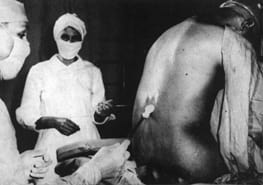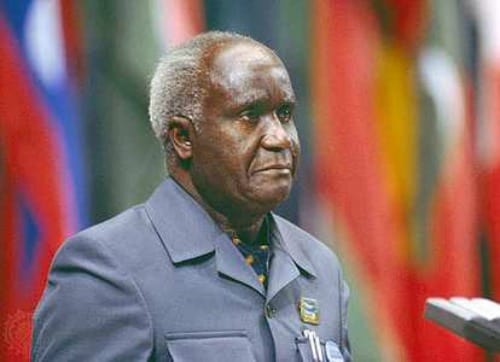The Tuskegee Experiment was a 40-year research project that studied the effects of the disease syphilis when left untreated. Black rural farm workers were the subjects of the U.S. government-sponsored study and were kept in the dark as they were being left to suffer. A whistleblower revealed the unethical and morally unjust aims of the study, after he went to the press on this day in 1972.
SEE ALSO: Zambian President Accuses Briton, U.S. of ‘Kissing Apartheid’ on This Day in 1986
For four decades, the U.S. Public Health Service (PHS) studied the effects of the untreated  disease in 600 Black men from Macon County, Ala. Starting in 1932, 399 of the 600 sharecroppers to be studied were already afflicted with the venereal disease. The farmers were led to believe that they were being treated for “bad blood,” a term used to describe a number of unknown ailments. The Tuskegee Institute, also in Alabama, was the site where the study took place.
disease in 600 Black men from Macon County, Ala. Starting in 1932, 399 of the 600 sharecroppers to be studied were already afflicted with the venereal disease. The farmers were led to believe that they were being treated for “bad blood,” a term used to describe a number of unknown ailments. The Tuskegee Institute, also in Alabama, was the site where the study took place.
The PHS neglected to tell the men they were infected, and kept the news hidden. Even in the 1940s when penicillin was proven to be a sound treatment for syphilis, they were still left untreated.
Further, Black PHS workers and Tuskegee Institute members may have also been duped in to thinking they were doing the greater good, with Black nurses and assistants routinely corralled the men for blood samples and the like.
The syphilis spread to the families of the men in devastating fashion. By the end of the experiments, 28 men died from the disease, another 100 died from complications related to the disease, 40 of the wives contracted syphilis, and 19 children were born with congential syphilis.
Peter Buxtun, a White PHS venereal disease researcher, raised concerns he had with the study to the Center for Disease Control (CDC) in 1966. Buxtun felt that the study was unethical and was told that the experiments would continue until all the subjects perished. He was joined by a handful of other PHS employees who rallied against the study.
Amazingly, Black medical associations supported the aims of the study, although it isn’t clear how much they knew regarding the intentional withholding of treatment. In fact, the entire medical community seemingly supported the Tuskegee trials.
Buxtun bypassed conventional routes and was able to get the insidious nature of the study out to the public by way of the Washington Star. Buxtun revealed to a reporter the true machinations of the experiments, and major news outlets picked it up accordingly.
Sen. Edward Kennedy called several Congressional hearings over the matter, which Buxtun and other researchers testified. The National Association for the Advancement of Colored People (NAACP) filed a class action lawsuit, which later settled for $9 million. The settlement also included free treatment to the surviving study patients and their families.
In 1974, Congress passed the National Research Act, which helped develop guidelines for human medical research and was sparked by the findings at Tuskegee.
On May 16, 1997, then-President Bill Clinton apologized to the study participants and their families, calling the act “racist.”
Learn more about the Tuskegee Experiment here:
SEE ALSO: Gambia President Dawda Jawara Ousted from Power on This Day in 1994











